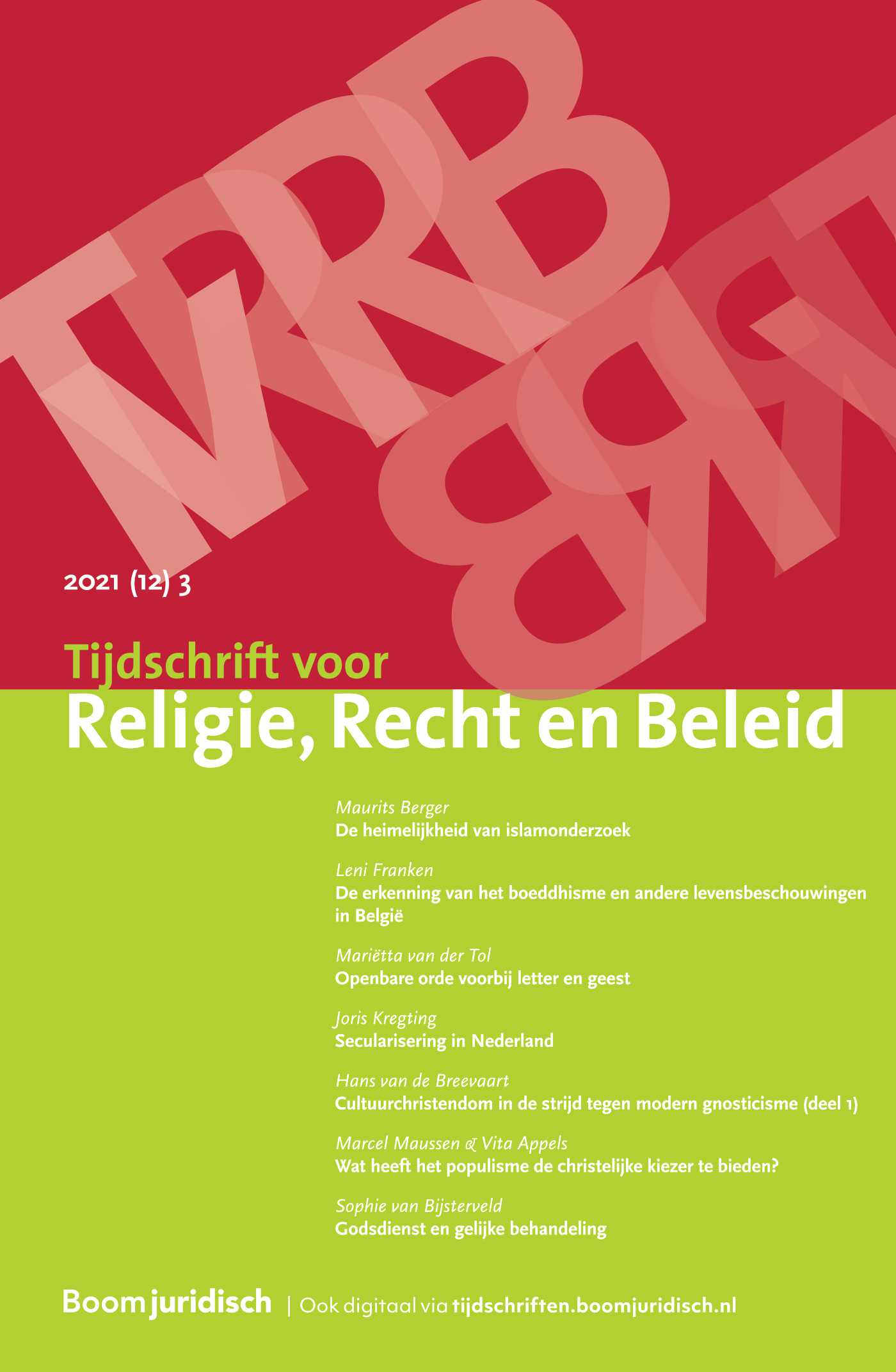|
In 2020, the Belgian federal Government announced that it will recognize Buddhism as a non-confessional worldview. This recognition will give the Buddhists several privileges: the salaries and pensions of lama’s as well as of Buddhist consultants in prisons, hospitals and the army will be paid for by the state. In addition, state schools will be required to organize Buddhist education at parental request. From the perspective of equal treatment and within the current constitutional framework, the recognition of Buddhism can only be welcomed. But is this constitutional framework, which is amongst others indebted to the concordat between Napoleon and the Holy See (1801), still up to date? In 1983, the Dutch Government abolished this Napoleonic model of state financing and opted for a profound reform of the system. In this article, I will show why such a reform could also be useful and inspiring in the Belgian context. |


Tijdschrift voor Religie, Recht en Beleid
Meer op het gebied van Algemeen
Over dit tijdschriftMeld u zich hier aan voor de attendering op dit tijdschrift zodat u direct een mail ontvangt als er een nieuw digitaal nummer is verschenen en u de artikelen online kunt lezen.
| Overwegende ... |
De heimelijkheid van islamonderzoek |
| Auteurs | Maurits Berger |
| Auteursinformatie |
| Artikel |
|
| Trefwoorden | boeddhisme, financiering religies/levensbeschouwingen, geestelijke verzorgers, godsdienstig en humanistisch vormingsonderwijs, België – Nederland |
| Auteurs | Leni Franken |
| SamenvattingAuteursinformatie |
| Artikel |
Openbare orde voorbij letter en geestSociale normen en religieuze intolerantie in het staatsrecht |
| Trefwoorden | openbare orde, veiligheid, religieuze vrijheid, ad libitum, tolerantie |
| Auteurs | Mariëtta van der Tol |
| SamenvattingAuteursinformatie |
|
The relative openness of the concept of public order is increasingly instrumentalised in legislation which affects religious minorities. This article argues that a permanent distinction must be made between social norms and public order, and that an appeal to social norms in the context of public order indicates a free, or ‘ad libitum’, use of constitutional law. |
| Artikel |
Secularisering in Nederland |
| Trefwoorden | Secularisering, Religie, Kerken, Modernisering |
| Auteurs | Joris Kregting |
| SamenvattingAuteursinformatie |
|
The Netherlands has witnessed a strong process of secularization, the rapid decline of institutionalized Christianity, i.e. the churches. An important explanation for this process is educational expansion: the increase in the number of highly educated people in the Netherlands contributes to the decline of religion. Other instances of modernization, such as individualization, provide additional explanations for secularization. As modernization continues, secularization will do so too with consequences for the churches themselves, but also for related social and cultural structures in the area of, for example, the media or education, for the tolerance between religious and secular Dutch and for citizen participation. |
| Artikel |
Cultuurchristendom in de strijd tegen modern gnosticisme (deel 1)Een alternatieve verklaring voor het huidige populisme |
| Trefwoorden | cultuurchristendom, gnosticisme, populisme, Voegelin, Immanentisering |
| Auteurs | Hans van de Breevaart |
| SamenvattingAuteursinformatie |
|
This article takes issue with the tendency among political scientists and cultural critics to reduce the current rise of populism to resentment among certain groups in society. Instead, the article argues that particularly right-wing populist cultural criticism is derived from the Christian conceptual foundations of Western culture. Typical for these foundations has been the process of ‘diversification’ as defined by the American political philosopher Eric Voegelin (1901-1985). As such, ‘diversification’ is diametrically opposed to the so-called ‘immanentization of the eschaton’ characteristic of modern Gnosticism. Populism is to be understood as a counter-movement to this Gnostic tendency in politics. |
| Artikel |
Wat heeft het populisme de christelijke kiezer te bieden?Een vergelijking van de verkiezingsprogramma’s van Forum voor Democratie, de Partij voor de Vrijheid, JA21 en christelijke partijen voor de parlementsverkiezingen van 2021 |
| Trefwoorden | Christelijke kiezer, populisme, verkiezingsprogramma’s |
| Auteurs | Marcel Maussen en Vita Appels |
| SamenvattingAuteursinformatie |
|
In recent years, it has often been suggested that the CDA, and to a lesser extent the ChristenUnie (CU) and the Staatkundig Gereformeerde Partij (SGP), are losing voters to right-wing populist parties. To examine this proposition, the article first looks at which ‘Christian voters’ would be inclined to vote for right-wing populist parties. Next, a comparison is made between the positions of Forum voor Democratie (FvD), the Partij voor de Vrijheid (PVV) and JA21 and Christian parties, with respect to issues that are important to Christian voters. An analysis of the various election programmes for the 2021 parliamentary elections shows that while there is overlap between Christian and right-wing populist parties when it comes to limits on religious freedom and moral issues, there also remain significant differences and shared positions are often underpinned by very different arguments. |
| Jurisprudentie en wetgeving |
Godsdienst en gelijke behandelingDe uitspraak van het Hof van Justitie van de EU in de zaken WABE en Müller |
| Trefwoorden | gelijke behandeling, godsdienstvrijheid, Hof van Justitie, EU, Islam |
| Auteurs | Sophie van Bijsterveld |
| SamenvattingAuteursinformatie |
|
In its ruling in these prejudicial procedures, the EU Court of Justice clarifies the extent to which private employers are allowed to prohibit visual expressions of inter alia religious beliefs in the workplace. This contribution critically discusses the Court’s interpretation of the concepts of direct and indirect discrimination as well as its definition of the criteria that the employer must meet to objectively justify a difference of treatment of employees indirectly based on inter alia religion. Furthermore, it discusses the room that the Court allows in this respect for national provisions that protect freedom of religion. |

